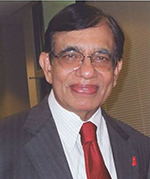
Cancer – What’s the Answer? Part V

SCREENINGS ARE A WAY OUT!
Checking for cancer in people who do not have any clinical symptoms or signs as yet is called screening. One of the biggest challenges facing our health care scientists is ‘how to eliminate cancer’ from the body at its onset. Cancer screening is the answer and it should be a regular part of your life.
A 70-year-old friend of mine had to get up in the middle of the night to go to the bathroom one day. This was unusual but when the same problem started happening every night, he consulted a urologist who thought his prostate was mildly enlarged. Later, a serum PSA test (Prostate Specific Antigen) showed elevated levels, which led to further testing that revealed cancer in his prostate gland. Fortunately, it was in the early stage and he didn’t have any metastatic lesions, not even local spread. Surgery followed by appropriate chemotherapy removed the entire cancer burden and he has remained free of cancer now for more than five years.
The American Cancer Society has issued cancer screening guidelines for the past 40 years that are being revised constantly. With new technologies available, we can not only detect the presence of cancer in the body but we may be able to identify even specific cancer types as well. “GetScreened” is the American Cancer Society’s new campaign that encourages people to get back on track with their recommended cancer screenings.
Let me give you some examples. Breast cancer, a common disease, can be detected early with periodic mammograms (X-ray of the breast) along with clinical examination (palpation of the breast). Screening mammogram is recommended once a year for all females, beginning at age 45. Lung cancer is common especially in chronic smokers or in those who have at least a 20 pack-year smoking history. (This is the number of packs of cigarettes per day multiplied by the number of years smoked.) Smokers who present with cough or have seen a tinge of blood in their sputum should have a chest X-ray and sputum analysis without delay. The American Cancer Society recommends yearly lung cancer screening in high-risk patients with low-dose computed tomography (LDCT scan) that uses less radiation, for people who are 55 and older, are in fairly good health and also meet the following conditions: ‘Currently smoke or have quit in the past 15 years.’ This has proven to be effective among individuals considered to be at high risk. Cancer of the cervix, a common cancer in women all over the world, can be detected early by the ‘Pap test,’ done by examining cervical smear for potentially precancerous or cancerous cells in the cervix.
Colorectal cancer is another common cancer that can be detected through early screening tests that include sigmoidoscopy, colonoscopy and stool test for occult blood. In addition to detecting early cancerous lesions, these endoscopies can detect polyps, which are abnormal precancerous growths that can be removed before they turn into cancer. For those who are averse to endoscopy, a ‘virtual colonoscopy’ that allows the colon and rectum to be examined from outside the body using a low dose computed tomography (CT), can be used. More recently, a stool DNA test has also become available.
Current recommendation is to start screening from the age of 45-50 onward. The prostate-specific antigen (PSA) blood test, as mentioned earlier, has been used along with a digital rectal examination, for prostate cancer screening. Thankfully, many prostate cancers are not deadly but all the same, it’s important make an early diagnosis. In regards to skin cancer, common in Florida, early detection starts with you. Take the time to look at your own skin to see any black moles or other new lesions are cropping up, and if so, observe them closely to see if they are getting bigger or developing symptoms like itching, bleeding, etc. And consult a dermatologist if there is any suspicion.
Several blood tests are also used to get an idea if any cancer is brewing in the body. One such is measurement of Carcinoembryonic Antigen (CEA) in the blood, which may be elevated in many types of cancers. Another one is Alfa-Fetoprotein in blood that can be elevated in liver and testicular cancers. However, these blood tests are non-specific and elevated levels do not always mean the presence of cancer.
These are just a few of the cancer screening tests in common practice. Your physician will guide you to take the right tests at the right time for early detection. Because of these screenings, cancer deaths are coming down.
M.P. Ravindra Nathan, M.D., is a cardiologist and Emeritus Editor of AAPI Journal. For further reading, “Second Chance - A Sister’s Act of Love” by Dr. Nathan from Outskirts Press, can be found at www.amazon.com